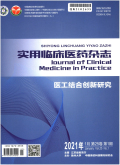实用临床医药杂志2023,Vol.27Issue(22):1-5,5.DOI:10.7619/jcmp.20231413
智能语音随访系统在缺血性卒中二级预防中的应用分析
Application analysis of intelligent speech follow-up system in secondary prevention of ischemic stroke
摘要
Abstract
Objective To analyze the application of intelligent speech follow-up system in sec-ondary prevention of ischemic stroke(IS).Methods A total of 842 IS patients who received intra-venous thrombolysis were randomly divided into intelligent group and artificial group.In the artificial group,corresponding intelligent follow-up templates were developed for the main risk factors affecting the occurrence of IS.The intelligent follow-up system determined the follow-up time and period ac-cording to the reserved information of patients when they were discharged,automatically called out the patients'home conditions for follow-up,and converted the response contents into text mode for out-put.The artificial group was followed up by professionally trained nursing staff,and the follow-up con-tent was the same as that of the intelligent group.Call out,hypertension,diabetes,medication,exer-cise,average call time and satisfaction of follow-up in the two groups were collected.Results The tel-ephone connection rates showed no statistical significances between two groups(P>0.05).During the follow-up calls,the correct recognition rate of follow-up contents in the intelligent group was low-er,and therateof unwillingness to cooperate and call interruption rate were higher than those in the control group(P<0.05).There were no statistically significant differences in the percentages of au-tomatic message leaving,inconvenient answering,resident death,family members unable to answer and number error between the two groups(P>0.05),and there was no statistical significance in the distribution of disconnected calls between the two groups(P>0.05).In the effective follow-up calls,there was no statistical significance in the answers to questions related to hypertension and diabetes,compliance and exercise between the two groups(P>0.05).The average call duration in the intel-ligent group was significantly shorter,and follow-up satisfaction was lower than that in the control group(P<0.05).Conclusion Intelligent voice follow-up system can replace manual telephone follow-up to a certain extent,and help medical staff understand the compliance of home blood pres-sure,blood sugar,medication,exercise and secondary prevention in IS patients,and can save fol-low-up time and improve follow-up efficiency compared with manual follow-up,but its language rec-ognition and improvement of cooperation rate still need to be optimized.关键词
缺血性脑卒中/二级预防/随访/智能语音系统/配合率/依从性Key words
ischemic stroke/secondary prevention/follow-up/intelligent speech system/cooperation rate/compliance分类
医药卫生引用本文复制引用
尹毅丹,杨建萍,孙宁,马宝英,刘小玲..智能语音随访系统在缺血性卒中二级预防中的应用分析[J].实用临床医药杂志,2023,27(22):1-5,5.基金项目
陕西省自然科学基础研究项目(2022JM-483) (2022JM-483)
陕西省人民医院科技发展基金项目(2021HL-18) (2021HL-18)

